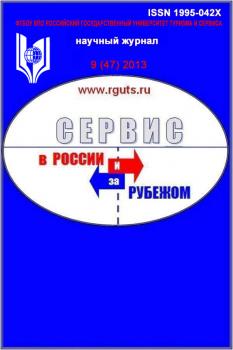St. Petersburg, Russian Federation
St. Petersburg, Russian Federation
The article considers Leningrad region as a territory with enormous potential for the ecological tourism development. The authors show the features of the physic-geographical position and associated natural features of the region. They are the following: climate, relief, inland waters, flora and fauna, which together predetermine the multifaceted possibilities for the creation and development of ecological tours. Moreover, the well-developed network of specially protected natural areas is an important issue. The region has central, neighbor and coastal geographical position and borders with economically developed regions. all this provides additional opportunities to attract tourists and form a tourist flow. According to recent rating research, now the region belongs to areas with relatively high indicators of tourism development. In general Leningrad region has the index value of the tourist infrastructure development level below the average value obtained for the subjects of the North-western Federal District. The authors offer their understanding of the term of «ecological tourism», and pay particular attention to the fact that this type of tourism can be developed both in specially protected natural areas and outside them. In the article special attention is paid to identifying the reasons of the low attendance of specially protected natural areas and the unpopularity of ecological tours. On this basis the article proposes the measures to stimulate the ecological tourism development in Leningrad Region. The last one is promising segment of the market that positively affects the region’s development, including economic sphere.
ecological tourism, specially protected natural territories, sustainable development, Leningrad region
1. Bogatyreva D.S. Ekologicheskiy turizm: komparativnyy analiz opredeleniy // Izvestiya Volgogradskogo gosudarstvennogo pedagogicheskogo universiteta. 2015. №9-10(104). S. 78-83.
2. Velichkina A.V. Ocenka razvitiya turistskoy infrastruktury regiona // Ekonomicheskie i social'nye peremeny: fakty, tendencii, prognoz. 2014. №2(32). S. 239-250.
3. Vetrova Yu.V. Ekologicheskiy turizm na territorii Leningradskoy oblasti (na primere OOPT «Prirodnyy park «Vepsskiy les») // Meteorologicheskiy vestnik. 2010. T.3. S. 74-79.
4. Gadzhieva E.A. Ekologicheskiy turizm, kak odno iz perspektivnyh napravleniy turistskoy sfery Leningradskoy oblasti // Aktual'nye problemy gumanitarnyh i social'nyh nauk: Mezhd. nauchno-prakt. konf. SPb., 2014. S. 47-50.
5. Zhukov P.V. Osobo ohranyaemye prirodnye territorii Rossii kak perspektivnye ekodestinacii v ekologicheskom turizme // Ekologicheskoe ravnovesie: struktura geograficheskogo prostranstva: Mater. mezhd. nauchno-prakt. konf. LGU im. A.S. Pushkina. SPb., 2016. S. 194-200.
6. Zhukov P.V. Razvitie ekodestinaciy v Rossii // Aktual'nye problemy razvitiya industrii gostepriimstva: Mezhd. nauchno-prakt. konf. SPb., 2016. S. 146-149.
7. Komisarova T.S., Sokolova A.A. Unikal'nye landshafty Leningradskoy oblasti // Geografiya v shkole. 2003. №3. S. 33.
8. Komissarova T.S., Gadzhieva E.A. OOPT kak resurs ekologicheskogo prosvescheniya i duhovno-nravstvennogo vospitaniya naseleniya // Ekologicheskoe ravnovesie: prirodnoe i istoriko-kul'turnoe nasledie, ego ohranenie i populyarizaciya: Mater. mezhd. nauchno-prakt. konf. LGU im. A.S. Pushkina. SPb., 2015. S. 7-9.
9. Olifir D.I. Prirodnyy turizm kak faktor razvitiya konkurentosposobnosti turistskih destinaciy Leningradskoy oblasti // Geografiya: razvitie nauki i obrazovaniya. Kollektivnaya monografiya po mater. Mezhd. nauchno-prakt. konf. LXIX Gercenovskie chteniya. SPb., 2016. S. 392-397.
10. Pogodina V.L. Teoriya i praktika organizacii obrazovatel'nogo ekologicheskogo turizma na territorii Leningradskoy oblasti. SPb.: Izd-vo RGPU im. A.I. Gercena, 2006. 411 s.
11. Sevast'yanov D.V., Korostelev E.M. Ekologicheskiy turizm v Leningradskoy oblasti: problemy i perspektivy // Regional'naya ekologiya. №3-4. 2004. S. 75-82.
12. Shkuropat S.G. Tematicheskie parki i ih rol' v sohranenii i populyarizacii istoriko-kul'turnogo naslediya v Rossii // Ekologicheskoe ravnovesie: prirodnoe i istoriko-kul'turnoe nasledie, ego sohranenie i populyarizaciya: Mater. mezhd. nauchno-prakt. konf. LGU im. A.S. Pushkina. SPb., 2015. S. 76-80.
13. Buchsbaum B.D. Ecotourism and Sustainable Development in Costa Rica. Virginia Polytechnic Institute and State University. College of Architecture and Urban Studies. 2004. 59 p. URL: https://theses.lib.vt.edu/theses/available/etd-05052004-171907/unrestricted/ Ecotour-ismCostRica.pdf (Data obrascheniya: 17.03.2017).
14. Eriksson F., Lidström M. Sustainable development in ecotourism. Tour operators managing the economic, social and environmental concerns of sustainable development in Costa Rica. Sweden, Umeå School of Business and Economics, 2013. 68 p. URL: http://www.divaportal.org/smash/get/diva2:642300/FULLTEXT01.pdf (Data obrascheniya: 17.03.2017).
15. Kiper T. Role of Ecotourism in Sustainable Development // Advances in Landscape Architecture. 2013. Ch. 31. DOI:https://doi.org/10.5772/55749.
16. Muhamedieva S.A., Zolotareva S.A., Kulgaina K.E. Concept of sustainable tourism in Russia: problems and prospects // International Multidisciplinary Scientific Conference on Social Sciences and Arts SGEM2014. Book 2. Vol.3. 2014. Pp. 99-104. DOI:https://doi.org/10.5593/sgemsocial2014/B23/S7.012.
17. Tourism in Russia: A Management Handbook. Ed. by Dimanche F., & Andrades-Caldito L. Bingley, UK: Emerald Group Publishing Limited, 2015. 448 p.
18. Velander K. Ecotourism Salvation or Exploitation? Institute for Science & Health Innovation, Edinburgh Napier University, 2012. URL: www.geos.ed.ac.uk. (data obrascheniya: 20.03.2017).
19. Vinogradov E.S. Development of ecological tourism in protected areas of Russia // Nauchnyy rezul'tat. Ser. Tehnologii biznesa i servisa. 2015. T.1. №2. S. 22-28.





